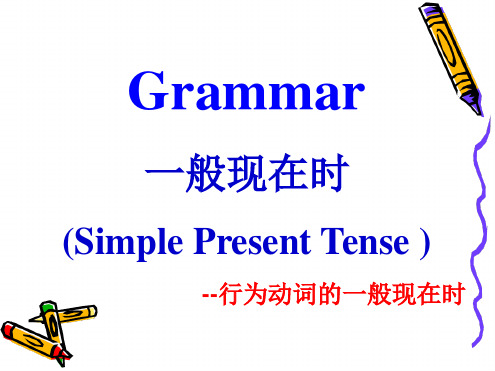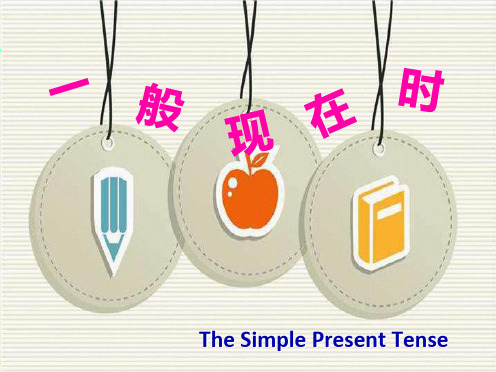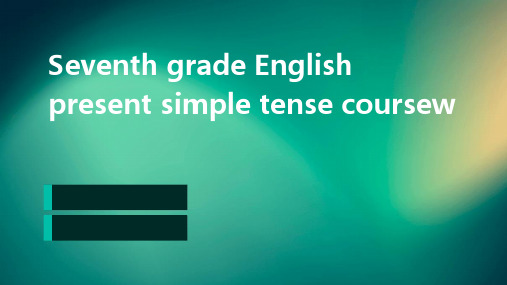初中英语中考复习一般现在时学习课件(共25张ppt)
合集下载
七年级英语一般现在时PPT课件.ppt

7. I often __p_l_a_yfootball at weekends. (play) 8. Simon's father often __w__a_t_cfhooetsball games on
TV. (watch)
9. Millie __r_e_a_d_ sbooks at home. (read)
2、连系动词 例句:He is ten years old .
I feel happy .
3、助动词 例句:Do you have a sister?
He doesn't speak English.
4、情态动词
例句:We must go now.
She can speak English.
一般现在时的构成:
My name is Amy. He is ten years old.
---be动词的一般现在时。 I often play football after school.
He watches TV every day. -----行为动词的一般现在时
动词的种类
行为动词的一般现在时的构成:(看例句并总结规律, 注意观察红色和蓝色字体。) 1、I play football every day . 2、You play football every day . 3、My friends play football every day . 4、He plays football every day . 5、Tom plays football every day . 6、My brother plays football every day . 总结规律: 当主语是第一、第二人称和第三人称复数时,行为动 词使用其原形。当主语是第三人称单数时,行为动词 使用其第三人称单数形式。 行为动词一般现在时的第三人称单数形式
时态复习公开课课件_初中英语中考时态复习课件(绝对精品).ppt

is comes is drawing moved didn’t have
used has studies will visit
Composition: I
Write an article about yourself, tell us your past、your present and your future.(你的过去、现在和将来)
clothes every day.
2.Sometimes he __p_l_a_y__s_ (play)
basketball over there.
3.How often d_o__e_s Sally _s_i_n_g__(sing)?
专项练习
• 1 I can take Li Ming there when he _____ ( come) to visit.
• 其时间状语为often(经常)、 usually(通常)、
always(总是)、 sometimes(有时)等频率副词, on Saturdays(在星期六)、 in the morning(afternoon evening)(在早上(下午 晚 上)) 、every day(每天) 等。
1.The twins ___w__a_s_h____(wash) the
1.The twins ___w_a__sh__e_d__(wash) the
clothes yesterday.
2.The day before yesterday he
_p_l_a_y_e__d_ (play) basketball over there. 3._D_i_d__ Sally _s_i_n_g__(sing) two hours
重读闭音节以一个 辅音字母结尾的, 双写这一字母+ing
一般现在时课件ppt(共25张PPT)

Jim
➢ Jim plays computer games every Sunday.
➢ He goes to school on foot everyday.
➢ He goes to school on foot everyday.
大家来找茬
He work very late every day. -Does you study English yourself?
She usually eats breakfast at 7:00.
play => plays
go => goes
• 以o, s, sh, ch, x结尾的动词,在词尾加es
She often goes to school at 8:00.
=> teach teaches I go to school every weekday.
She usually eats breakfast at 7:00.
He never eats breakfast.
She often goes to school at 8:00. I go to school every weekday.
My piano is quite new.
The earth moves
box => boxes
fly => flies
• 以辅音字母加y结尾的动词,要先将y变成i,再加 es
*26个字母中除AEIOU五个元音字母外,其余皆为辅音字母
study => studis
guesses
finishes
carries
snows
stops
sees
drives
中考英语语法专项复习课件(共25张PPT)

shall/will be done am/is/are been done
was/were being done
was/were being done
情态动词+be+done
• They play football on Sunday.
Practice
Football is played by them on Sunday.
They used this room for resting.
This room was used for resting by them.
We will have a sports meeting next week.
A sports meeting will be had by us next week.
bought Which is the picture that ______you _____ ______ last week?
专题三 被动语态
时态
被动语态结构
表格:被动态基本结构 一般现在时
一般过去时
一般将来时 现在进行时 过去进行时 现在完成时 过去完成时
am/is/are done
was/were done
客观真理 自然现象 公式定理 名言警句 时态不变
陈述句
He will be back in an hour. The teacher says. says that The teacher ____ ____he will be back in an hour.
一般疑问句
Does he like English? I wonder. If he _____ likes English. I wonder _____ ____
was/were being done
was/were being done
情态动词+be+done
• They play football on Sunday.
Practice
Football is played by them on Sunday.
They used this room for resting.
This room was used for resting by them.
We will have a sports meeting next week.
A sports meeting will be had by us next week.
bought Which is the picture that ______you _____ ______ last week?
专题三 被动语态
时态
被动语态结构
表格:被动态基本结构 一般现在时
一般过去时
一般将来时 现在进行时 过去进行时 现在完成时 过去完成时
am/is/are done
was/were done
客观真理 自然现象 公式定理 名言警句 时态不变
陈述句
He will be back in an hour. The teacher says. says that The teacher ____ ____he will be back in an hour.
一般疑问句
Does he like English? I wonder. If he _____ likes English. I wonder _____ ____
初中英语语法——四大基本时态课件(共24张ppt)

____(ring, ra√ng, rung).
现在进行时使用环境、句型变化
★作谓语的动词用来表示动作(情况)发生时间的 各种形式称为时态。
★概念:表示现阶段或说话时正在进行的动作及行 为。
★时间状语:Now, at this time, days, look. listen等时 间状语做标志。
★基本结构:主语+be +doing +其他 ★否定形式:主语+be +not +doing+其他 ★一般疑问句:把be动词放于句首。
事,正要做某事。 ⑤某些动词,可用进行时态表将来,如come,
现在进行时的用法
1)、现在(说话的瞬间)正在进行或发生的动作,强调“此时此刻” E.g. He is reading . They are talking now.
2)、当前一段时间内的活动或现阶段正在进行的动作。 E.g. They are working these days.
3)、 某些动词的现在进行时,表预定的计划或即将发生的动作。 E.g I am coming.
一般现在时--句型变化
❖ ③含有be动词的要在be上做变化.
❖
Danny is a good student. 陈述句
❖
丹尼是个好学生。
❖
Danny isn't a good student. 否定句
❖
丹尼不是个好学生。
❖
Is Danny a good student? 一般疑问句
❖
丹尼是个好学生吗?
此句中给出的do指“做,干”, not指把此句变为否定句, 故须在do前加助动词don't。
做题时常见错误五、对主语的数判断有误
现在进行时使用环境、句型变化
★作谓语的动词用来表示动作(情况)发生时间的 各种形式称为时态。
★概念:表示现阶段或说话时正在进行的动作及行 为。
★时间状语:Now, at this time, days, look. listen等时 间状语做标志。
★基本结构:主语+be +doing +其他 ★否定形式:主语+be +not +doing+其他 ★一般疑问句:把be动词放于句首。
事,正要做某事。 ⑤某些动词,可用进行时态表将来,如come,
现在进行时的用法
1)、现在(说话的瞬间)正在进行或发生的动作,强调“此时此刻” E.g. He is reading . They are talking now.
2)、当前一段时间内的活动或现阶段正在进行的动作。 E.g. They are working these days.
3)、 某些动词的现在进行时,表预定的计划或即将发生的动作。 E.g I am coming.
一般现在时--句型变化
❖ ③含有be动词的要在be上做变化.
❖
Danny is a good student. 陈述句
❖
丹尼是个好学生。
❖
Danny isn't a good student. 否定句
❖
丹尼不是个好学生。
❖
Is Danny a good student? 一般疑问句
❖
丹尼是个好学生吗?
此句中给出的do指“做,干”, not指把此句变为否定句, 故须在do前加助动词don't。
做题时常见错误五、对主语的数判断有误
2025年中考英语一般现在时复习课件(共21张PPT)

+_s_ walk—walks 将_y_改为 _i_+_e_s_ fly—flies
+_e_s_ watch—watches
一些以__o__结尾的动词
+_e_s_
have的第三人称单数为has
go—goes do—does
练一练
come-- comes go-- goes stay-- stays teach-- teaches eat-- eats fish-- fishes fix-- fixes discuss-- discusses do-- does fly-- flies have-- has play-- plays study-- studies work-- works finish-- finishes
e.g. He is not (isn’t)a worker. You are not (aren’t) thirteen. They are not (aren’t) in the classroom.
一、 be 动词的一般现在时的句式
一般疑问句:Be+ _主__语___+ _其__它___?
e.g. Is he a worker?
0%
never 从未
一般现在时态的基本句式:
一、 be 动词的一般现在时的句式:
肯定句:_主__语__+_b__e_+表语(n., adj. ,num.等)
e.g. He is a worker. You are thirteen. They are in the classroom.
否定句:_主__语___+_b__e_+ _n_o_t_+表语
我每天骑自行车上学。
一般现在时复习课-ppt课件完整版

-I always ... -I often ... -I sometimes ... -I never ...
Let's talk about super stars activities.
-What does he/she do at home?
( )+动词s/es...
If you are winner,you will get a post
A. learn
B. learns
C. learnt
( A ) 3 . They _ _ _ _ _ _ to go to Beijing last week .
A. went
B. go
C. going
( B ) 4 . Lily usually _ _ _ _ _ _ _ to school by bus .
Unit 2
Katie always gets up early .
一般现在时复习课
Let's chant!
take take takes a walk read read reads a book eat eat eats some food play play plays a game make make makes the bed clean clean cleans the floor watch watch watches a film
21
小练笔
根据课文一般现在时写出你或朋友 的日常活动;
My friends is ...He always_____ at 7:00 p.m.He _____ at 7:20.He ...
See you next time.
Thank you!
Let's talk about super stars activities.
-What does he/she do at home?
( )+动词s/es...
If you are winner,you will get a post
A. learn
B. learns
C. learnt
( A ) 3 . They _ _ _ _ _ _ to go to Beijing last week .
A. went
B. go
C. going
( B ) 4 . Lily usually _ _ _ _ _ _ _ to school by bus .
Unit 2
Katie always gets up early .
一般现在时复习课
Let's chant!
take take takes a walk read read reads a book eat eat eats some food play play plays a game make make makes the bed clean clean cleans the floor watch watch watches a film
21
小练笔
根据课文一般现在时写出你或朋友 的日常活动;
My friends is ...He always_____ at 7:00 p.m.He _____ at 7:20.He ...
See you next time.
Thank you!
初中一般现在时(精讲)ppt课件

friends. • 6、Those chairs aren’t(not) broken. • 7、The bag isn’t(not) mine.
精选课件
20
情态动词的一般现在时
• 构成 主语 + 情态动词 + 动词原形+其他 She can speak English.
注意:情态动词后的动词一定要用原形
Does he like playing computer?
He plays computer once or twice a week.
• play the computer
精选课件
5
Is yaoming good at playing basketball?
Yes,he is good at playing basketball.
Is yaoming good at playing basketball?
No, he does not / No, he doesn’t
play basketball
精选课件
6
how about this?
chessboa精r选d课件 棋盘
7
Do you like this sport? No, I never play chess. No, I seldom play chess.
1. My father_l_is_t_e_n_s_(listen) to the radio every day.
2. Mike_st_u_d_i_e_s_ (study) in a middle school.
3. She_t_a_k_e_s_(take) Eddie for a walk after supper.
精选课件
20
情态动词的一般现在时
• 构成 主语 + 情态动词 + 动词原形+其他 She can speak English.
注意:情态动词后的动词一定要用原形
Does he like playing computer?
He plays computer once or twice a week.
• play the computer
精选课件
5
Is yaoming good at playing basketball?
Yes,he is good at playing basketball.
Is yaoming good at playing basketball?
No, he does not / No, he doesn’t
play basketball
精选课件
6
how about this?
chessboa精r选d课件 棋盘
7
Do you like this sport? No, I never play chess. No, I seldom play chess.
1. My father_l_is_t_e_n_s_(listen) to the radio every day.
2. Mike_st_u_d_i_e_s_ (study) in a middle school.
3. She_t_a_k_e_s_(take) Eddie for a walk after supper.
中考英语总复习 专题10 动词的时态和语态课件

归纳现在进行时的构成
主语+am/is/are+动词-ing形式
现在进行时的用法
1.表示(biǎoshì)现在(指说话人说话时)正在发生的事情。如: We are waiting for you. 我们正在等你。 2.表示当前一段时间内的活动或现阶段正在进行的动作。如: Mr.Green is writing another novel these days.
A.takes B.took
C.will take D.has taken
第五页,共二十三页。
归纳一般过去时的构成
主语+was/were/did+其他 一般过去时的用法 (1)表示过去某个时间或某一段时间内发生的动作或存在(cúnzài)的状 态。常见的时间状语有:yesterday,last week,an hour ago,the other day,in 1982等。如: Where did you go just now?
您还要些什么吗?
I wondered if you could help me. 我在想你能不能帮我一下。
②情态动词 could,would。如:
Could you lend me your bike? 你的自行车能借我用一下吗?
第七页,共二十三页。
(三)现在(xiànzài)进行时
第八页,共二十三页。
(一)常考的被动语态
A.Invites
C.was invited
B.is invited
D.has invited
第十八页,共二十三页。
2.(2017—2018学年(xuénián)安徽合肥蜀山50中西区第三次月考)If more salt
C to the soup,it will taste better. A.will add B.adds C.is added D.will be added 3.(2018·安徽合肥庐阳区二模,44)All the people I have known in the past three
初中英语语法时态(共25张PPT)

A.goes B.will go
C.would go D.are going
2.--Did your son fail his English exam once again?
--Yes, but he told me he____hard next term.
A.studies B.is studying C.will studyD.would study
2 have been to+地点,表示“去过某
地”。(人已回) I have been to Europe. (I am not in Europe now.)
3 have been in+地点+时间段,表示“在/ 来某地多久”。
I have been in Europe for three weeks. (I am now still in Europe .)
3.现在完成时和一般过去时的异同点: 1 共同点:动作都在过去。 2 不同点:和现在有无关系。(与现
在有关的过去动作用现在完成,与现在 无关的过去动作用一般过去。)
4.易错点:
1 have gone to+地点,表示“去了某地”。
(人已走,尚未回。只用于第三人称。)
They have gone to Europe. (They are not here.)
C.didn’t he
D.did he
三、现在进行时
1.用法:
A.现刻动作:目前正在发生的动作。
B.现阶段动作:目前一个时期一直在进 行的动作,此刻不一定在进行。
2.标志词:now,Look! Listen!
中考模拟:
--Mike, who____football in the yard?
初中英语一般现在时学习(共25张)ppt课件

.
be 的用法口诀
我用am,你用are, is连着他,她,它; 单数名词用is, 复数名词全用are。
.
Exercise
• 1、Kitty ( ) an English girl. • 2、We ( ) students. • 3、I ( ) from Taizhou. • 4、She ( ) tall. • 5、Lucy and Lily ( ) good friends. • 6、Those chairs ( ) broken. • 7、The bag ( ) mine.
go-goes [z] do-does [z] have--has
.
• 一、 写出下列动词的第三人称单数
• talk______forget______hope______stop______ play______say______buy______worry_____
• fly______study_______like_______make_____ • give______see______swim______wash_____
Maplay football
play(第三人称单数) plays He always ( ) football on Saturdays.
.
• 1、大多数动词在词尾直接加s, 如read → reads look→ looks play→ plays
.
Exercise
• 8.I ( ) a boy. • 9.You ( ) a girl. • 10.He ( ) a teacher.
.
(二)、行为动词的一般现在时 1、肯定句的构成
主语 + 行为动词 + 其他
I get up at 7:00 every day.
be 的用法口诀
我用am,你用are, is连着他,她,它; 单数名词用is, 复数名词全用are。
.
Exercise
• 1、Kitty ( ) an English girl. • 2、We ( ) students. • 3、I ( ) from Taizhou. • 4、She ( ) tall. • 5、Lucy and Lily ( ) good friends. • 6、Those chairs ( ) broken. • 7、The bag ( ) mine.
go-goes [z] do-does [z] have--has
.
• 一、 写出下列动词的第三人称单数
• talk______forget______hope______stop______ play______say______buy______worry_____
• fly______study_______like_______make_____ • give______see______swim______wash_____
Maplay football
play(第三人称单数) plays He always ( ) football on Saturdays.
.
• 1、大多数动词在词尾直接加s, 如read → reads look→ looks play→ plays
.
Exercise
• 8.I ( ) a boy. • 9.You ( ) a girl. • 10.He ( ) a teacher.
.
(二)、行为动词的一般现在时 1、肯定句的构成
主语 + 行为动词 + 其他
I get up at 7:00 every day.
中考英语总复习之一般现在时(共23张PPT)

your mother usually lunch ? 23. Li Xing goes home late. (变为一般疑问句)
Li Xing home late ?
24. Li Xing goes home late on Friday afternoon . (对画线部分提问) Li Xing goes home late ?
she often a drink of water after supper ?
31. That is an apple tree . (变为复数句)
32. Mike’s birthday is February 19th . (对画线部分提问) is Mike’s birthday ?
33. Come down to our new shop, please. (变为否定句) to our new shop, please.
三.用所给动词的适当形式填空。 1. My classmate (know) the man on the bike . 2. His sister usually (go) to school at 7:00 am . 3. Lin Tao (like) his new sweater . 4. Let me (have) a look . 5. Let’s (play) tennis !
Thank you!
10. The twins very happy because they want to go to a movie . 11. Our class big , but their class small . 12. The basketball club exciting and fun . 13. The girl in red clothes my sister . 14. Lily’s room not very big . 15. It _______ nice to meet you. 16. Your name _______ nice. 17. What class you in ?
Li Xing home late ?
24. Li Xing goes home late on Friday afternoon . (对画线部分提问) Li Xing goes home late ?
she often a drink of water after supper ?
31. That is an apple tree . (变为复数句)
32. Mike’s birthday is February 19th . (对画线部分提问) is Mike’s birthday ?
33. Come down to our new shop, please. (变为否定句) to our new shop, please.
三.用所给动词的适当形式填空。 1. My classmate (know) the man on the bike . 2. His sister usually (go) to school at 7:00 am . 3. Lin Tao (like) his new sweater . 4. Let me (have) a look . 5. Let’s (play) tennis !
Thank you!
10. The twins very happy because they want to go to a movie . 11. Our class big , but their class small . 12. The basketball club exciting and fun . 13. The girl in red clothes my sister . 14. Lily’s room not very big . 15. It _______ nice to meet you. 16. Your name _______ nice. 17. What class you in ?
七年级英语一般现在时课件(复习课)

Usage
The Simple Present Tense is used when referring to general truths, habits, and present actions.
The Simple Past Tense is used when referring to actions that took place in the past.
The usage of auxiliary verbs do/dos
在此添加您的文本17字
Summary: The auxiliary verbs "do" and "dos" are used in the present simple tense to negate or emphasize the action.
Interrogative sentence
• Subject: "you/he"
Interrogative sentence
Verb: "eat"
This sentence is used to ask a question about an action or a fact in the present time.
Practice and
05 consolidation of the simple present tense
Fill in the blank practice
总结词
通过填空练习,学生可以巩固对简单现在时的理解和运用。
详细描述
教师提供一系列句子,其中一些关键词或短语被省略,要求 学生根据上下文语境填写正确的单词或短语,以完整呈现句 子意思。这种练习有助于学生掌握动词时态和语态的变化, 以及在不同语境中的正确使用。
The Simple Present Tense is used when referring to general truths, habits, and present actions.
The Simple Past Tense is used when referring to actions that took place in the past.
The usage of auxiliary verbs do/dos
在此添加您的文本17字
Summary: The auxiliary verbs "do" and "dos" are used in the present simple tense to negate or emphasize the action.
Interrogative sentence
• Subject: "you/he"
Interrogative sentence
Verb: "eat"
This sentence is used to ask a question about an action or a fact in the present time.
Practice and
05 consolidation of the simple present tense
Fill in the blank practice
总结词
通过填空练习,学生可以巩固对简单现在时的理解和运用。
详细描述
教师提供一系列句子,其中一些关键词或短语被省略,要求 学生根据上下文语境填写正确的单词或短语,以完整呈现句 子意思。这种练习有助于学生掌握动词时态和语态的变化, 以及在不同语境中的正确使用。
初中英语一般现在时和一般过去时(PPT25张)

16
构成
☞ 当句子中既没有 be动词,也没有情态动词时,则在主语前加助动词 did 变成一 般疑问句;在主语后谓语动词前加助动词 didn’t 变成否定句,助动词后的动词要 变成动词原形。 ①陈述句:She had a dog five years ago. 一般疑问句→ Did she have a dog five years ago? 否定句→ She didn’t have a dog five years ago.
fly________ learn ________ read_________ buy________
18
巩固练习
用动词适当形式填空 1. Tom and Mary _______ (come) to China last month. 2. Mike _______(not go) to bed until 12 o’clock last night, so I ______ (get ) up late. 3. Mary _______ (read) English yesterday morning. 4. There _______ (be) no one here a moment ago. 5. I listened but _______ (hear) nothing.
9
巩固练习
用动词的适当形式填空 1. We often________(play) in the playground. 2. He ________(get) up at six o’clock. 3. _______you_______(brush) your teeth every morning? 4. What_______ (do) he usually______ (do) after school? 5. Danny_______(study)English, Chinese, Maths, Science and Art at school.
构成
☞ 当句子中既没有 be动词,也没有情态动词时,则在主语前加助动词 did 变成一 般疑问句;在主语后谓语动词前加助动词 didn’t 变成否定句,助动词后的动词要 变成动词原形。 ①陈述句:She had a dog five years ago. 一般疑问句→ Did she have a dog five years ago? 否定句→ She didn’t have a dog five years ago.
fly________ learn ________ read_________ buy________
18
巩固练习
用动词适当形式填空 1. Tom and Mary _______ (come) to China last month. 2. Mike _______(not go) to bed until 12 o’clock last night, so I ______ (get ) up late. 3. Mary _______ (read) English yesterday morning. 4. There _______ (be) no one here a moment ago. 5. I listened but _______ (hear) nothing.
9
巩固练习
用动词的适当形式填空 1. We often________(play) in the playground. 2. He ________(get) up at six o’clock. 3. _______you_______(brush) your teeth every morning? 4. What_______ (do) he usually______ (do) after school? 5. Danny_______(study)English, Chinese, Maths, Science and Art at school.
- 1、下载文档前请自行甄别文档内容的完整性,平台不提供额外的编辑、内容补充、找答案等附加服务。
- 2、"仅部分预览"的文档,不可在线预览部分如存在完整性等问题,可反馈申请退款(可完整预览的文档不适用该条件!)。
- 3、如文档侵犯您的权益,请联系客服反馈,我们会尽快为您处理(人工客服工作时间:9:00-18:30)。
5. They ______ (watch) TV on Sundays.
6. Miss Li_______ (teach) Chinese. 1. Look at the animal, it ____(have) four legs.
8
• Are you clear?
Homework(家庭作业)
1. My father_______(listen) to the radio every day.
2. Mike often_______ (play) football.
Fill in the blank
3. I______(take) pictures on Mondays.
4. He always_______(wash) clothes at 7:00.
they go shopping every Sunday They ( ) shopping every Sunday.
my mother
read books every morning
My mother ( ) books every morning.
Jim play computer games every Monday
Mary (
) songs every Thursday.
• 一、 写出下列动词的第三人称单数
• talk______forget______hope______stop______ play______say______buy______worry_____ • fly______study_______like_______make_____ • give______see______swim______wash_____ finish_______teach_______ go_______do_____ have_____
• 1、大多数动词在词尾直接加s, 如read → reads look→ looks play→ plays 2、以辅音字母加y结尾的动词,要先将y变为i,再加es 如:fly →flies carry →carries study →studies 26个字母中 除A E I O U五个元音字母外,其余21个都 是辅音字母 3、以“s, x, ch, sh”结尾的,在词尾加“es”,发音为[iz] 如: teach-teaches [iz]; watch-watches [iz] box---boxes 4、以“o”结尾的动词,加“es”,读[z] 如: go-goes [z] do-does [z] have--has
二、一般现在时的构成
系动词be的一般现在时 实义(行为)动词的一 般现在时
• (一)、系动词be的一般现在时
1、肯定句的构成: 主语 + be + 其他
The girl is my friend.
2.be动词包括哪些 ?
am is are 什么时候用is? 什么时候用am? 什么时候用are?
be 的用法口诀 我用am,你用are, is连着他,她,它; 单数名词用is, 复数名词全用are。
Jim plays computer games every Monday.
play football
play(第三人称单数) plays He always ( ) football on Saturdays.
Mary
sing songs
sing(第三人称单数) sings every Thursday
Exercise
• 8.I ( ) a boy. • 9.You ( ) a girl. • 10.He ( ) a teacher.
Exercise
• • • • • • • 1、Kitty ( ) an English girl. 2、We ( ) students. 3、I ( ) from Taizhou. 4、She ( ) tall. 5、Lucy and Lily ( ) good friends. 6、Those chairs ( ) broken. 7、The bag ( ) mine.
usually
[ˈju:ʒuəli]
['ɔ:lweiz]
always
we
play football
every Wednesday
We ( ) football every Wednesday.
my father and I go swimming
every suBiblioteka dayMy father and I ( ) swimming every Sunday
I get up at 7:00 every day.
He reads English every morning.
Watch TV
I often (
) TV at 8:00.
2、频率副词
never
有时,时而 常常,经常
sometimes
[ˈsʌmtaɪmz]
often
[ˈɔfən]
通常,经常
一直, 总是
1、every系列
• • • • • • • •
每天 day year 每年 每月 month week 每周 morning 每天早上 afternoon 每天下午 evening 每天晚上 Mondays... 每周一
• every
(二)、行为动词的一般现在时 1、肯定句的构成
主语 + 行为动词 + 其他
一般现在时 The simple present tense
Let's chant
Like,like, what do you like? Running, running, I like running. Like, like, what does he like? Swimming, swimming, he likes swimming. Like, like, what does she like? Fishing, fishing, she likes fishing.
1.将所学内容重新看一遍。 2.当一回小老师,给爸爸妈妈讲解什 么是一般现在时。
Summary(课堂小结)
• • • • • • • • 一、一般现在时的用法 1、表示经常性或习惯性的动作 2、表示目前的状态 二、一般现在时的构成 (1)be动词【is、am、are】 肯定句:主语+be+其他. (2)行为动词 肯定句:主语+动词+其他。
